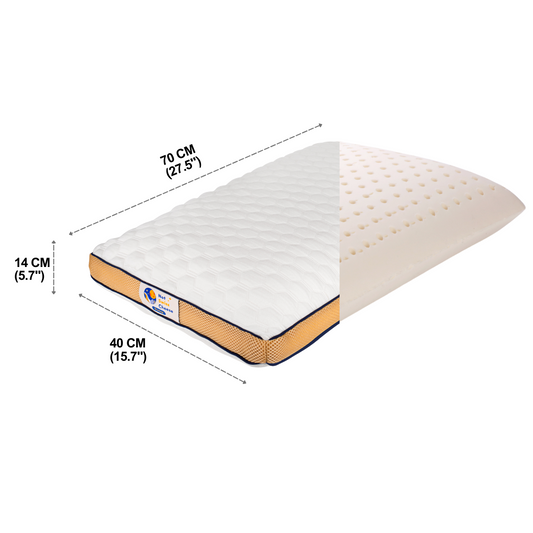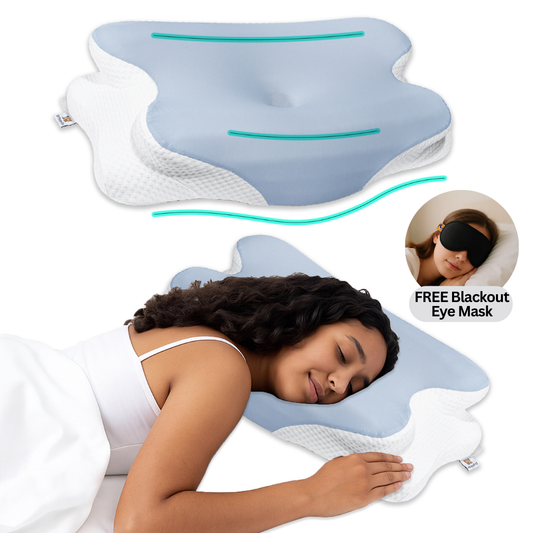REM sleep is critical for mental and physical health, yet many people are unknowingly losing it due to modern habits and medications. Here’s what you need to know:
- What is REM sleep? A vital stage of sleep for memory, learning, and emotional stability. Adults need about 2 hours of REM sleep nightly.
- Why are we losing REM sleep? Factors include alcohol, certain medications (like antidepressants), artificial light, and overloaded schedules.
- Health risks: Poor REM sleep can increase dementia risk, weaken the immune system, and raise chances of heart disease, obesity, and hypertension.
-
How to improve REM sleep:
- Stick to a consistent sleep schedule.
- Avoid caffeine and alcohol before bed.
- Create a calming bedtime routine.
- Use supportive pillows like latex options.
- Keep your room cool (60–67°F) and quiet.
Losing REM sleep can have serious consequences, but small changes in your habits and environment can make a big difference.
7 Things Ruining Your REM Sleep
Health Effects of Poor REM Sleep
Adults getting less than two hours of REM sleep regularly face serious risks to both their mental and physical health.
Mental and Emotional Effects
REM sleep plays a key role in managing emotions. When this stage is disrupted, even a 1% drop in REM sleep can increase the risk of dementia by 9%. It also affects brain networks responsible for emotional regulation, making it harder to solve problems, maintain mood stability, and think creatively .
"Lose your dreams, and you will lose your mind." – The Rolling Stones
Physical Health Problems
The impact of poor REM sleep isn’t limited to the brain - it can also harm the body. Studies show a direct connection between inadequate REM sleep and various health issues. Research from the Icahn School of Medicine at Mount Sinai revealed that sleep restriction over six weeks caused changes in immune cells. Dr. Cameron McAlpine explains:
"Not only were the number of immune cells elevated, but they may be wired and programmed in a different way at the end of the six weeks of sleep restriction. Together, these two factors could potentially predispose someone for diseases like cardiovascular disease."
Here’s how poor REM sleep can affect different aspects of health:
| Health Metric | Impact of Poor Sleep |
|---|---|
| Immune Function | 3× higher risk of catching the common cold with less than 7 hours of sleep |
| Heart Health | A 1% increase in REM sleep lowers the risk of atrial fibrillation by about 14% |
| Metabolic Health | Irregular sleep patterns increase the risk of hypertension by 56% |
| Weight Management | Irregular sleep patterns raise obesity risk by 49% |
Dr. Filip Swirski, director of the Cardiovascular Research Institute at Icahn Mount Sinai, underscores the importance of consistent sleep:
"This work emphasizes the importance of adults consistently sleeping seven to eight hours a day to help prevent inflammation and disease, especially for those with underlying medical conditions."
These findings stress the need to address REM sleep issues through focused solutions.
sbb-itb-7fb8e9c
How to Get Better REM Sleep
Improving REM sleep can significantly impact your overall health. Here are some practical habits and natural approaches to help you sleep better.
Better Sleep Habits
Stick to a consistent sleep schedule to align with your body's internal clock and encourage uninterrupted REM sleep. Consider these tips:
- Exercise regularly: Aim for a 30-minute workout in the morning to help regulate your circadian rhythm.
-
Create a calming pre-sleep routine:
- Avoid caffeine and alcohol at least two hours before bed.
- Dim the lights and limit screen time 90 minutes before sleep.
- Take a warm bath or shower about an hour before bedtime.
- Spend the last 30 minutes on relaxing activities like reading or meditation.
Natural Sleep Solutions
Certain natural supplements can also aid in improving sleep quality:
- Melatonin: Can help reduce the time it takes to fall asleep.
- Magnesium: Known to promote relaxation.
- Valerian root: Traditionally used to encourage better sleep.
"Even natural sleep aids can cause side effects or interfere with how your medicines work." – Sharon Liao
For additional support, consider products like Not Swiss Cheese's Talalay latex pillows ($97.50). These pillows offer medium-soft support, proper spinal alignment, and natural breathability to keep you cool while resisting allergens.
Setting Up Your Bedroom for Better Sleep
Pillows That Support REM Sleep
The right pillow can make a big difference in achieving quality REM sleep. Natural latex pillows are a great choice because they provide reliable support, promote proper spinal alignment, and help reduce morning aches. Plus, they stay cool throughout the night, unlike memory foam options.
There are two main types of latex pillows to choose from:
- Dunlop latex ($74.99): Offers medium-firm support with 70% natural rubber content. It's a solid pick for those who need extra neck support.
- Talalay latex ($102.00): Provides a softer, more adaptable feel with 99% natural rubber content. This type works well for gentle head support.
Latex pillows are built to last, offering consistent support for over a decade without losing their shape.
"Our responsive latex foam pillows deliver exceptional pain relief and balanced support. They help alleviate muscle tension, promote proper spinal alignment, and minimize morning stiffness, ensuring a refreshed start to your day." – Not Swiss Cheese
Pairing a high-quality pillow with a comfortable sleep environment, like controlling temperature and noise, can enhance your overall rest.
Room Temperature and Sound Control
Creating the right sleep environment means keeping your room at a comfortable temperature and minimizing noise. Experts recommend maintaining a bedroom temperature between 60–67°F (15.5–19.4°C) for deeper REM sleep. Here's how you can achieve this:
- Use blackout curtains to block out light.
- Set up a programmable thermostat to lower the temperature at night automatically.
- Improve airflow with a ceiling fan or air circulation system.
To reduce noise disturbances, try these strategies:
- Use a white noise machine to mask unwanted sounds.
- Hang sound-dampening curtains.
- Seal gaps around windows and doors.
- Place draft stoppers under doors to block noise from other rooms.
These adjustments can help create a calm, comfortable space that supports better sleep.
Next Steps: Taking Action for Better Sleep
"You just want to do a few things to help you sleep better: Wake up at the same time each day, try to stop caffeine by 2 p.m., quit drinking any alcohol at least three hours before bed, and exercise daily"
Here are some practical tips to improve your REM sleep starting tonight:
-
Morning Routine
- Wake up at the same time every day, even on weekends.
- Spend 15–30 minutes outside in natural sunlight to regulate your body clock.
- Get at least 30 minutes of exercise in the morning to boost energy and improve sleep quality.
-
Daytime Habits
- Avoid caffeine after 2 p.m. to prevent it from disrupting your sleep cycle.
- Stop drinking alcohol at least three hours before bedtime to ensure deeper sleep.
- Keep your bedroom cool, ideally between 60–67°F (15.5–19.4°C), for a comfortable sleep environment.
-
Evening Wind-down
Start a relaxing bedtime routine 1–2 hours before bed. Try activities like:- Taking a warm bath to relax your muscles.
- Reading a book to calm your mind.
- Listening to soothing music.
- Doing light stretches to release tension.
-
Sleep Environment Upgrades
Consider replacing your pillow for better neck and head support. Options include:- Talalay natural latex pillow ($97.50): Offers gentle, supportive comfort.
- Dunlop natural latex pillow ($74.99): Provides firmer support for better alignment.
These small changes can make a big difference in the quality of your sleep.








